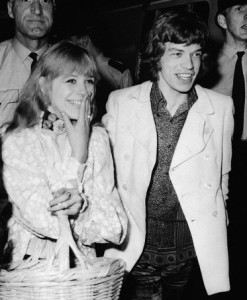 Marianne’s signature song, “As Tears Go By,” was the first original composition written by Jagger and fellow Rolling Stone Keith Richards. She inspired numerous Stones’ classics, including “Wild Horses,” “You Can’t Always Get What You Want,” “I Got the Blues,” and “Sister Morphine” (a song she most likely composed). She set the spark for “Sympathy for the Devil,” which Mick wrote after reading her copy of the famous Bulgakov satire “The Master and Margarita.” She’s disguised as “Carrie Anne” in the Graham Nash-penned Hollies tune and is the bird of the Beatles’ song “And Your Bird Can Sing.” But despite her aristocratic roots and her queenly position among the rock royalty of the day, life would never be easy or ordinary for Marianne Faithfull.
Marianne’s signature song, “As Tears Go By,” was the first original composition written by Jagger and fellow Rolling Stone Keith Richards. She inspired numerous Stones’ classics, including “Wild Horses,” “You Can’t Always Get What You Want,” “I Got the Blues,” and “Sister Morphine” (a song she most likely composed). She set the spark for “Sympathy for the Devil,” which Mick wrote after reading her copy of the famous Bulgakov satire “The Master and Margarita.” She’s disguised as “Carrie Anne” in the Graham Nash-penned Hollies tune and is the bird of the Beatles’ song “And Your Bird Can Sing.” But despite her aristocratic roots and her queenly position among the rock royalty of the day, life would never be easy or ordinary for Marianne Faithfull.
She was the daughter of divorced parents: a British, bohemian-styled psychology professor father and a baroness mother, the Viennese-born Eva von Sacher-Masoch, whose great uncle Leopold von Sacher-Masoch wrote Venus in Furs, the novel that spawned the word masochism. How fitting that Marianne would end up living a life nearly destroyed by masochism.
 She was the center of controversy, rumored to be wrapped in nothing but a fur rug as Mick nibbled on a Mars Bar lodged in her vagina (one of the greatest urban myths in rock history) at the moment the police stormed Keith Richards’ house to conduct a drug search in 1966. “It destroyed me,” she said of this incident. “To be a male drug addict and to act like that is always enhancing and glamorizing. A woman in that situation becomes a slut and a bad mother.”
She was the center of controversy, rumored to be wrapped in nothing but a fur rug as Mick nibbled on a Mars Bar lodged in her vagina (one of the greatest urban myths in rock history) at the moment the police stormed Keith Richards’ house to conduct a drug search in 1966. “It destroyed me,” she said of this incident. “To be a male drug addict and to act like that is always enhancing and glamorizing. A woman in that situation becomes a slut and a bad mother.”
And what do we make of that famous quote about having slept with all the Stones before settling on Mick as her springboard to fame? In her memoir, she explains that she was fed up with being portrayed in the media as a “ruthless adventuress,” and decided to manipulate this stuff to her own advantage. “It was somewhat of a perverse thing to do, but fun,” she said. (And in reality, Keith was the only Stone with whom she liaised, pre- and post-Mick!)
She lived through it all – chemical addiction, suicide attempts, homelessness, tuberculosis, anorexia, a miscarriage, and persecution by the press – and has emerged a brave, sober non-conformist whose timeworn voice can still rattle your bones. Faithfull is my favorite book about a woman’s rough ride through the rock jungle of the swinging sixties and toxic seventies.
Thanks, Marianne, for your courage and inspiration.
Here she is, singing a gorgeous Harry Nilsson song:
© Dana Spiardi, Dec 29, 2014
]]>Today is the 26th anniversary of the start of the Velvet Revolution, a peaceful student-led anti-government protest movement that led to the fall of communism in Czechoslovakia in December 1989. The name of the revolution stemmed directly from Lou Reed’s Velvet Underground, the house band of Andy Warhol’s Silver Factory art gallery/performance space in the 1960s. The Velvets’ stripped-down, subterranean sound and nihilistic attitude made them a favorite among avant-garde Czechs seeking mind-expanding alternatives to bland Soviet-spun art, literature, and music.
Within six weeks of the first demonstration on November 17, a playwright-poet-philosopher who had been imprisoned as a leading dissident became the country’s first democratically elected president in 41 years. His name was Vaclav Havel. He loved rock and roll, and was undoubtedly the first head of state to invite rockers to share their ideas. The photo above shows him with Lou Reed, Frank Zappa, and the Rolling Stones: all the president’s men.
During a trip to the U.S. in either 1967 or 1968, Havel bought a copy of a Velvet Underground album; no one is really sure if it was the band’s debut disc or “White Light/White Heat.” Said music writer Rob Jovanovic, “Havel took it home, along with Frank Zappa’s debut, and managed to smuggle it through Customs. Soon it was being copied and passed around the Prague underground, influencing the avant-garde set to play secretive gigs around the capital…” When Havel met Reed for the first time, early in his presidency, he was rumored to have said, “Did you know I am president because of you?” Following their first encounter, the hard-to-impress Lou Reed described Mr. Havel as a “heroic, intellectual, music-loving amazing person.”
The very serious Frank Zappa, whom Havel appointed a special “cultural ambassador,” was overcome with emotion when the president told him that Czechs used to be beaten by the Secret Police for listening to his music. In fact, Zappa’s song “Plastic People” inspired the name of a popular dissident Czech band, The Plastic People of the Universe, formed in 1968 following the Soviet clampdown that ended Czechoslovakia’s short-lived Prague Spring. Following the arrest and imprisonment of the group’s members in 1976, Havel declared that the Plastics were defending “life’s intrinsic desire to express itself freely, in its own authentic and sovereign way.” This led to the creation of a human rights organization known as Charter 77, a group of 242 petition signers who called for the human rights guaranteed under the 1975 Helsinki accords. Havel’s role in this movement, and his subsequent creation of the Committee for the Defense of the Unjustly Prosecuted in 1979, led to multiple imprisonments.
The Rolling Stones, bad-boys of the British rock scene, appealed to Havel’s rebellious nature. “For me, the Rolling Stones have always been a sort of counterweight to the more amiable, more lyrical and often more easygoing Beatles,” the president told Rolling Stone writer Roman Lipcik in the magazine’s October 4, 1990, issue. “I used to listen to their music often. Songs like ‘Satisfaction’ can hardly be forgotten.”
The Stones invaded Prague on August 18, 1990, three days before the twenty-second anniversary of the Soviet-led invasion of Czechoslovakia. Mick Jagger appeared on Czech state TV with a rallying cry: the Stones are rolling into town! Posters covered the city, announcing the tanks are rolling out! Keith Richards noted the president’s playful side: “We gave Vaclav this little white remote control with a tongue on it. He walked around lighting up the palace, and suddenly statues came alive. He was like a kid, pushing buttons and going, whoa!”
Czechoslovakia split into two separate entities in early 1993: the Czech Republic and Slovakia. I made 10 business trips to the CR in the early ’90s, during the height of Prague Spring Redux. I never had a chance to encounter any of my rock idols while there, but I could feel the spirit of rock and roll in my soul as I walked the cobblestone streets of marvelous, mysterious Prague, knowing that music truly did bring power to the people.
RIP, President Havel: October 5, 1936 – December 18, 2011.
RIP, Frank Zappa: December 21, 1940 – December 4, 1993.
RIP, Lou Reed: March 2, 1942 – October 27, 2013.
Here are the Plastic People of the Universe, with their rendition of the Velvet Underground’s “Run Run Run.”
© Dana Spiardi, Nov 17, 2015
]]>
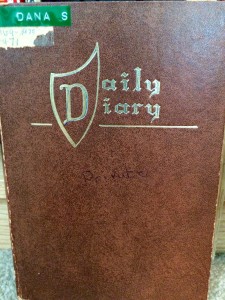 Later, when I got my Smith-Corona for Christmas of 1972 and learned to type, I found that I could more quickly capture my thoughts and emotions, which by now were gushing like torrents. I looked forward to that private period before bedtime, when I would sit in my room uninterrupted and bare my soul. (Today this is known as journaling and people get rich writing books and teaching seminars on how to do it.) I listened to my records as I wrote, and began each entry with a song lyric, like this one that expressed my adolescent confusion:
Later, when I got my Smith-Corona for Christmas of 1972 and learned to type, I found that I could more quickly capture my thoughts and emotions, which by now were gushing like torrents. I looked forward to that private period before bedtime, when I would sit in my room uninterrupted and bare my soul. (Today this is known as journaling and people get rich writing books and teaching seminars on how to do it.) I listened to my records as I wrote, and began each entry with a song lyric, like this one that expressed my adolescent confusion:
January 30, 1977
Wake up late without a smile
Telephone rings
You run like a child
On the street, into the day
The people I meet
Have nothing to say
–“Soul of the Sea” by Ann and Nancy Wilson of Heart, 1976
Yes, I related to Anne. We both had dark hair and eyes. We were both yearning to be free. We both wrote as a form of escape and self-therapy. And we seemed to have the same character; from all I’ve read, she was outspoken, opinionated, moody, and high-spirited. In other words, quite a handful, just like me.
And we were soul mates. Anne’s diary entry from April 5, 1944, completely captures the dreams and doubts that consumed me as a 13-year-old. It’s as if I’d written every word of it myself.
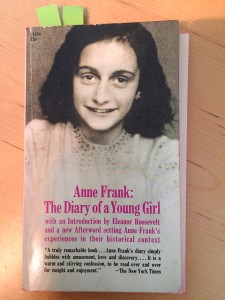 I finally realized that I must do my schoolwork to keep from being ignorant, to get on in life, to become a journalist, because that’s what I want! I know I can write…but it remains to be seen whether I really have talent…
I finally realized that I must do my schoolwork to keep from being ignorant, to get on in life, to become a journalist, because that’s what I want! I know I can write…but it remains to be seen whether I really have talent…
And if I don’t have the talent to write books or newspaper articles, I can always write for myself. But I want to achieve more than that. I can’t imagine living like Mother, Mrs. van Daan and all the women who go about their work and are then forgotten. I need to have something besides a husband and children to devote myself to! …
I want to be useful or bring enjoyment to all people, even those I’ve never met. I want to go on living even after my death! And that’s why I’m so grateful to God for having given me this gift, which I can use to develop myself and to express all that’s inside me!
When I write I can shake off all my cares. My sorrow disappears, my spirits are revived! But, and that’s a big question, will I ever be able to write something great, will I ever become a journalist or a writer?
It’s the question she poses in that last line that I still ponder daily: will I ever be able to write something great? I know that’s an ego-driven preoccupation, but aren’t all writers egocentric in their need to be read, in their desire (in Anne’s words), to be useful or bring enjoyment to all people? Today, I still have the ghost of the writer’s self-doubt that plagued Anne. Every time I finish an article for this blog, the worries begin: What if I can’t write another one? What if I run out of ideas or my abilities dry up? This isn’t necessarily a bad thing. It keeps me working and striving to improve. Bruce Springsteen has expressed these same sentiments time and again. “Have iron-clad confidence; but doubt — it keeps you awake and alert,” he once told a group of aspiring musicians.
 My teenage diary was filled with expressions of happiness and pride over incidents ranging from special (Mr. S. told me to keep writing and I’ll be published by the time I’m 25! – March 10, 1976) to superficial (today I wore my green corduroy outfit; it always brings me luck! – December 15, 1973).
My teenage diary was filled with expressions of happiness and pride over incidents ranging from special (Mr. S. told me to keep writing and I’ll be published by the time I’m 25! – March 10, 1976) to superficial (today I wore my green corduroy outfit; it always brings me luck! – December 15, 1973).
And more often than not, my pages were full of hopeless, ugly thoughts (I really don’t see that anything good will ever, ever happen to me in the future – February 3, 1977). Today, reading those rants of self pity, I feel foolish as I compare my silly problems to those of Anne Frank’s. The world was crumbling around her, and still she managed to embrace a glimmer of hope. On July 15, 1944, she wrote:
It’s a wonder I haven’t abandoned all my ideals, they seem so absurd and impractical. Yet I cling to them because I still believe, in spite of everything, that people are truly good at heart. It’s utterly impossible for me to build my life on a foundation of chaos, suffering and death. I see the world being slowly transformed into a wilderness, I hear the approaching thunder that, one day, will destroy us too, I feel the suffering of millions. And yet, when I look up at the sky, I somehow feel that everything will change for the better, that this cruelty too shall end, that peace and tranquility will return once more.
Anne continued to write in her diary until the day she and her family were seized from their hideout in Amsterdam and sent to the Nazi death camps: her father Otto to Auschwitz and she and her sister and mother to the Liebau camp and later to Bergen-Belsen, where she died of typhus a few months before British soldiers liberated the camp in April 1945.
Like Anne, I will continue to write till my stoney end.
© Dana Spiardi, June 12, 2015
]]>
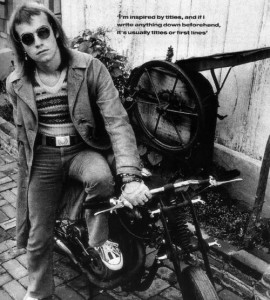
Bernie was no stranger to the slow, simple country life. He was born in a rural area in Lincolnshire, England – in a farmhouse that lacked electricity. Later, his father bought a run-down farm in the Lincolnshire village of Owmby-by-Spital. It was there that Bernie spent his days hitchhiking to dances, frequenting pubs and playing snooker. Boppin’ in the country, fishin’ in a stream — like the Honky Cat character he created.
His life changed forever in 1967 when he and Elton – unknown to one another – both answered a newspaper ad placed by a record label seeking new talent. Although neither artist passed the audition, Liberty Records’ A&R man Ray Williams put the two in contact, and they clicked. Bernie was 17 at the time. He’d end up following Elton down the yellow brick road to fame, but he’d never lose his memories of the family plow or the howling old owl in the woods.
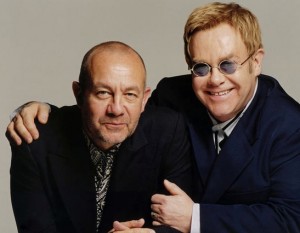 The two artists have collaborated on 30 albums through the years, but my favorites are the ones that evoke those idealized visions of an untamed, open-road America — the kind of place where we all picture ourselves rolling through the hay and running through the grass for hours. Your musical education won’t be complete until you’ve discovered the early gems — 11-17-70, Tumbleweed Connection, Madman Across the Water, and Honky Chateau – all released between 1970 and 1972. These works resonate with the beautiful sounds and images that formed everlasting grooves in my brain, many years ago.
The two artists have collaborated on 30 albums through the years, but my favorites are the ones that evoke those idealized visions of an untamed, open-road America — the kind of place where we all picture ourselves rolling through the hay and running through the grass for hours. Your musical education won’t be complete until you’ve discovered the early gems — 11-17-70, Tumbleweed Connection, Madman Across the Water, and Honky Chateau – all released between 1970 and 1972. These works resonate with the beautiful sounds and images that formed everlasting grooves in my brain, many years ago.
Here’s a real American beauty: “Amoreena” from “Tumbleweed Connection:” This song was used in the opening credits of the film “Dog Day Afternoon.” It’s interesting that a song about rural life would kick off a movie about a city crime caper.
“You’ll pick rotten peaches for the rest of your life.” This song about life on a chain gang is from “Madman Across the Water.” The album features two of Elton’s most enduring songs, “Tiny Dancer” and Levon.” Interestingly, “Madman” was the lowest-charting album of his career.
This is a live version of one of Elton and Bernie’s loveliest creations:
© Dana Spiardi, May 22, 2015
]]>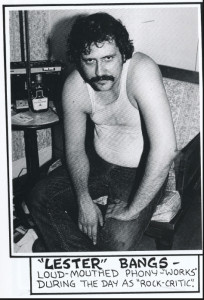 At one point in the interview, Lester said, “Hell, the only difference between you musicians and us rock writers is that people can see you doing what you do. I can’t go up in the street and say, ‘Hey, honey, dig my far-out John Lennon review,’ because she can say, ‘Kiss my ass, Jack, how I know you wrote that?'” At this, J. Geils singer Peter Wolf decided to challenge the critic, saying, “All right, then why don’t you come onstage with us tonight and do your thing and let’s see what happens?”
At one point in the interview, Lester said, “Hell, the only difference between you musicians and us rock writers is that people can see you doing what you do. I can’t go up in the street and say, ‘Hey, honey, dig my far-out John Lennon review,’ because she can say, ‘Kiss my ass, Jack, how I know you wrote that?'” At this, J. Geils singer Peter Wolf decided to challenge the critic, saying, “All right, then why don’t you come onstage with us tonight and do your thing and let’s see what happens?”
Lester, a frustrated musician, was in heaven. Joining the band onstage for their encore, “Give it To Me,” he produced such memorable riffs as “VDKHEOQSNCHSHNELXIEN(&H-SXN(E@JN?”. At the end of his performance, the perpetually unkempt scribe destroyed the typewriter in a move that would have made Pete Townshend proud. He even took a curtain call! Hey, to paraphrase Chuck Berry, “he could play a Smith Corona just like a’ringin’ a bell.”
Like gonzo journalist Hunter Thompson before him, Lester’s poetic, absurdly-witty rants came gushing from his drug-addled brain in stinging torrents and saturated the page – and it wasn’t always pretty. And, like Thompson, he often became the focal point of his essays. But aside from the shenanigans, he was a gifted writer whose pieces livened up the pages of magazines like Rolling Stone, Creem, New Musical Express, The Village Voice, and Playboy. He never sucked up to the rock stars he interviewed, never gushed (except over Lou Reed), and wasn’t afraid to tear a record to shreds. Rolling Stone publisher Jann Wenner once fired him for writing a particularly nasty review of a Canned Heat album. But Lester was never deterred. He wrote of his contempt for the music industry – and rock criticism in general – in biting, often hilarious terms. Lester could be rude and confrontational; he often opened his interviews with the most obnoxious question he could think of.
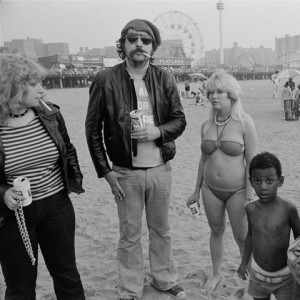 Soulless music was (nearly) as prevalent in Lester’s heyday as it is now, and he ripped plenty of artists a new blow-hole. But I would absolutely love to hear his take on today’s synthetic, auto-tuned music and the artists who get more press for wearing cupcake bras and marrying Kardashians than generating music. Can’t you just imagine him going toe-to-toe (or tongue-to-tongue) with Miley Cyrus in an interview. Opening question: “So, little Hannah Montana, which brand of vibrator do you use while composing your songs?” And, without blinking an eye, she’d tell him. You know she would.
Soulless music was (nearly) as prevalent in Lester’s heyday as it is now, and he ripped plenty of artists a new blow-hole. But I would absolutely love to hear his take on today’s synthetic, auto-tuned music and the artists who get more press for wearing cupcake bras and marrying Kardashians than generating music. Can’t you just imagine him going toe-to-toe (or tongue-to-tongue) with Miley Cyrus in an interview. Opening question: “So, little Hannah Montana, which brand of vibrator do you use while composing your songs?” And, without blinking an eye, she’d tell him. You know she would.
To get a sampling of his brilliance, read “Psychotic Reactions and Carburetor Dung,” a collection of his essays. And, for a great bio of Lester, check out “Let it Blurt: The Life and Times of Lester Bangs,” by Jim Derogatis.
Here’s a look at the late Leslie Conway Bangs. By the way, the late Philip Seymour Hoffman portrayed him in the film “Almost Famous.” Hoffman died in much the same way as Lester; though his drug of choice was heroin.
© Dana Spiardi, April 30, 2015
]]>